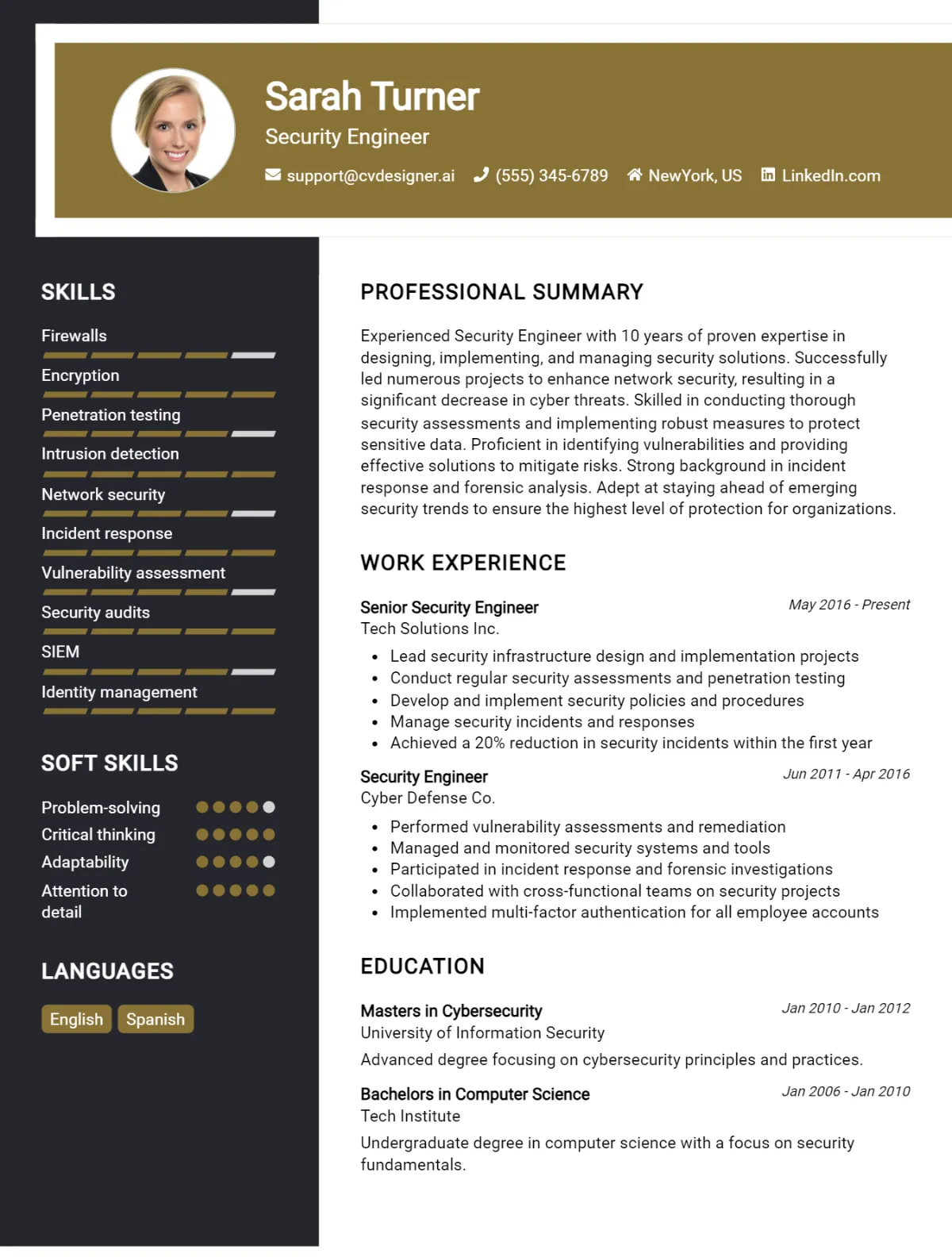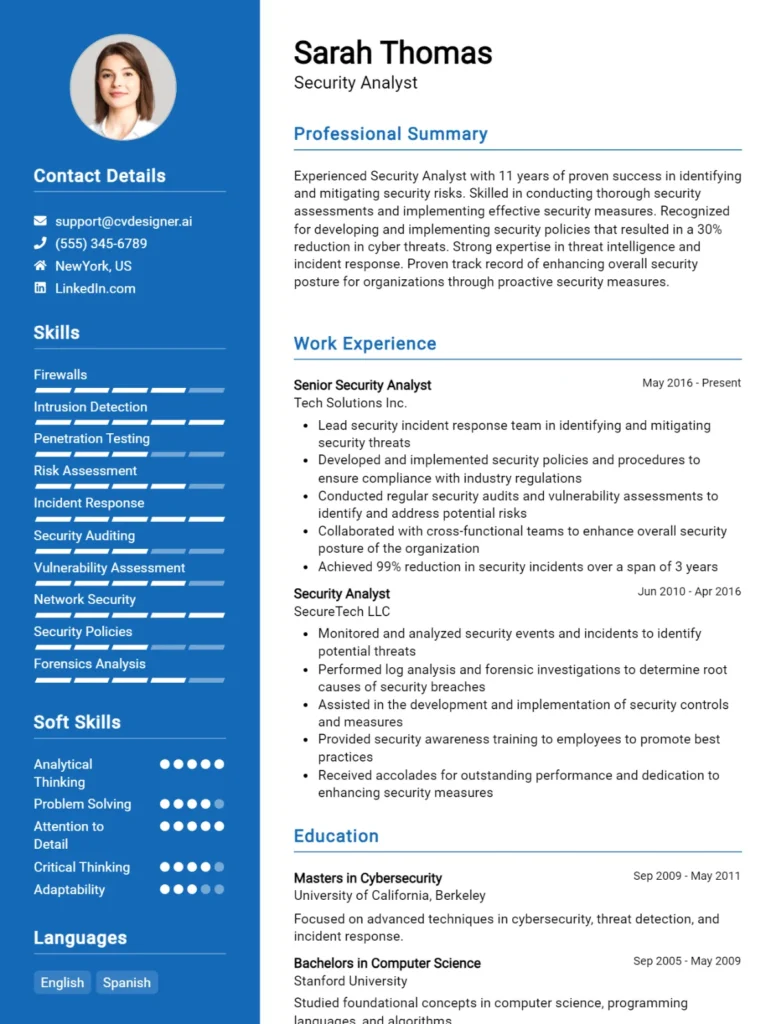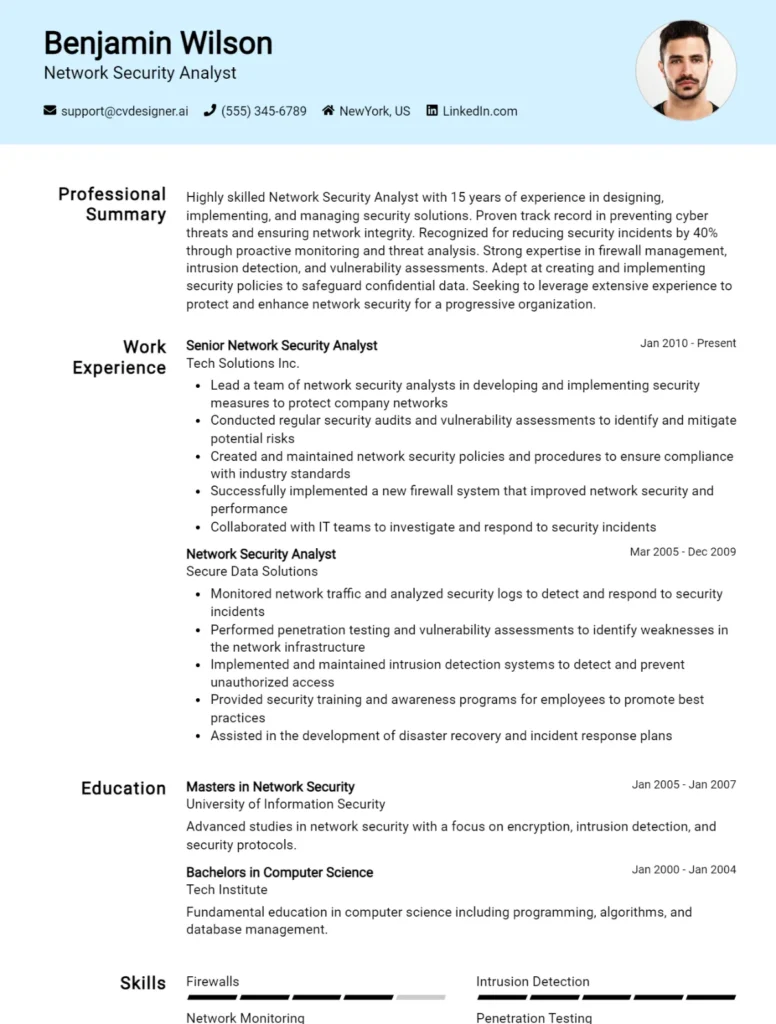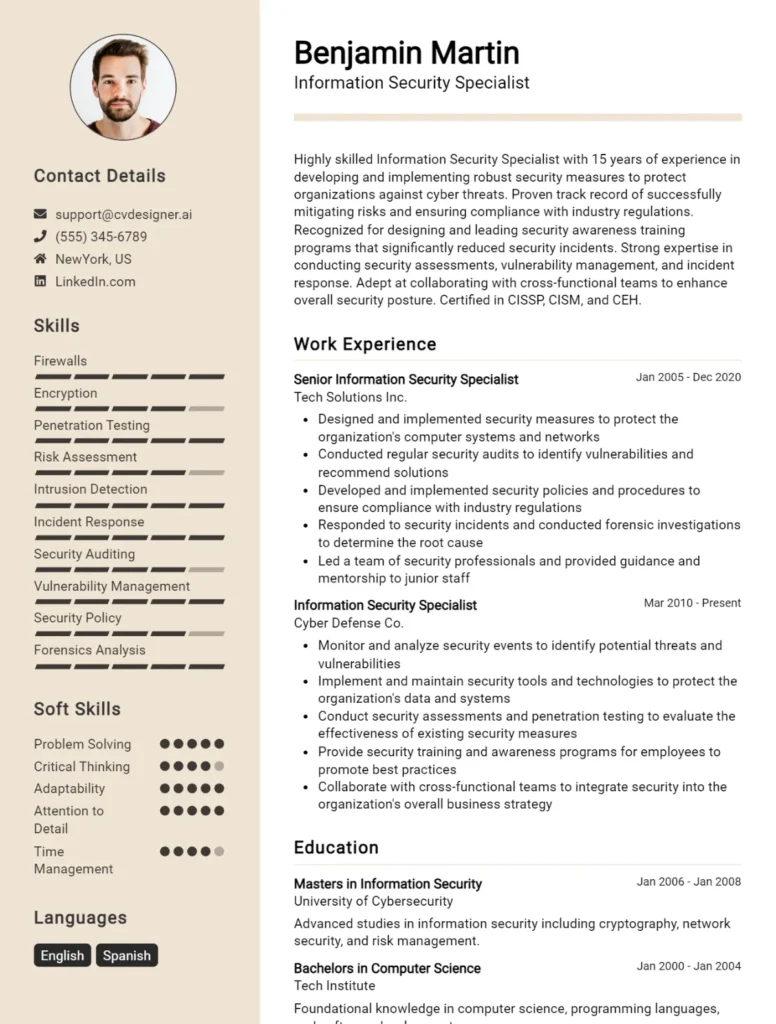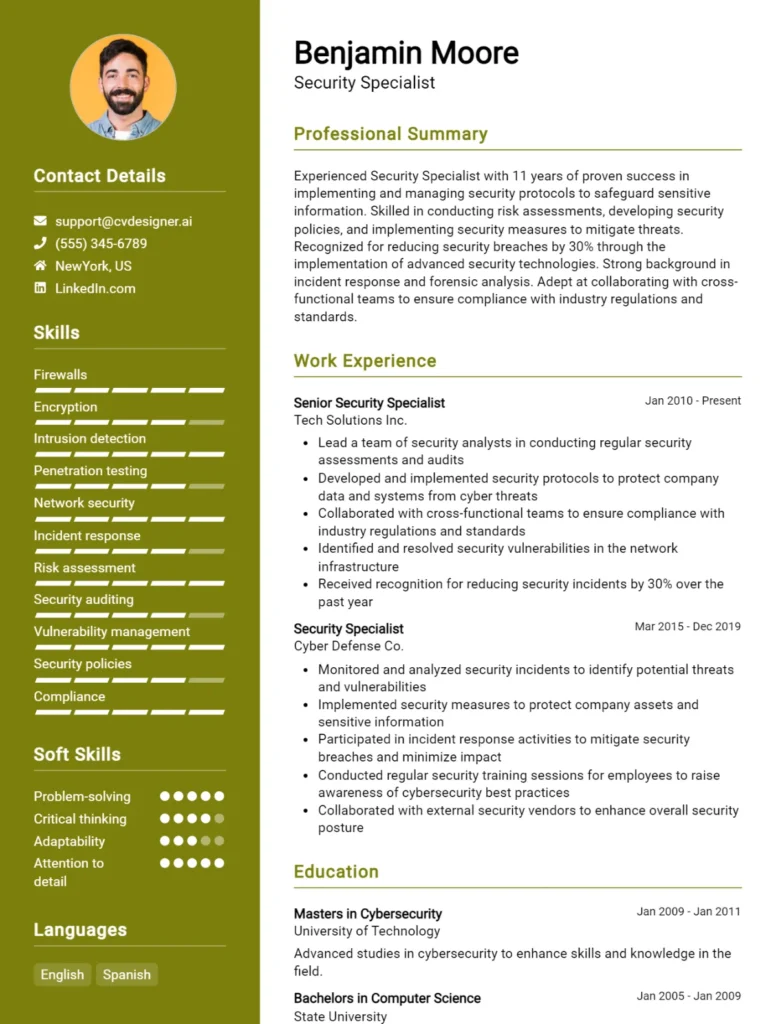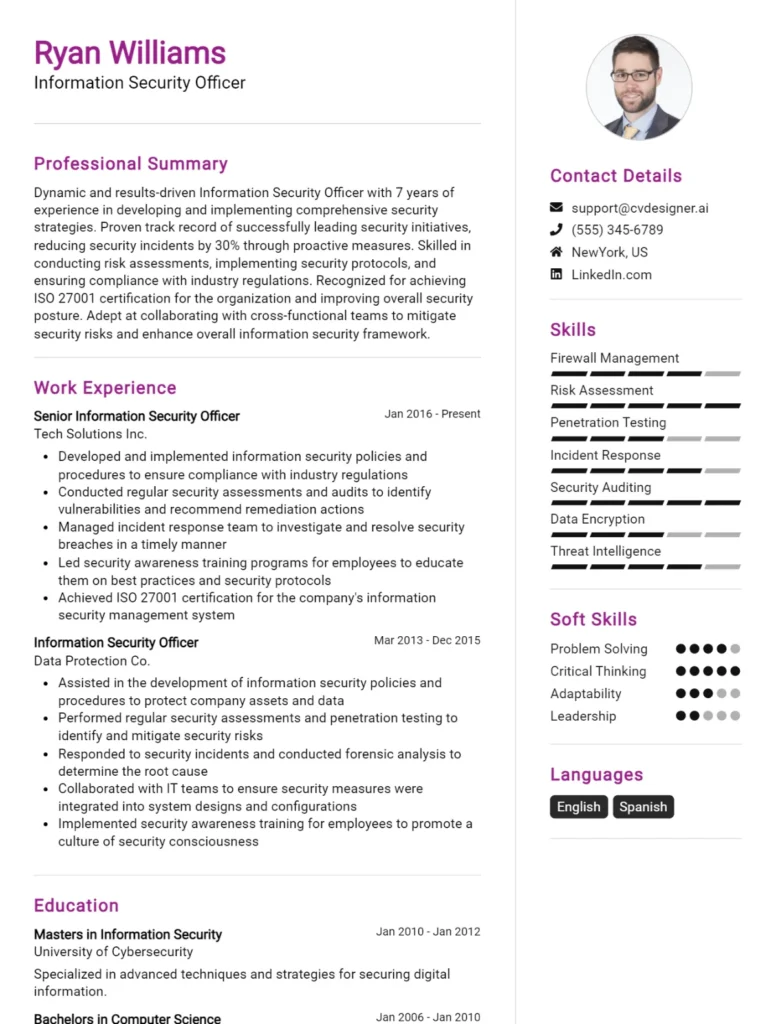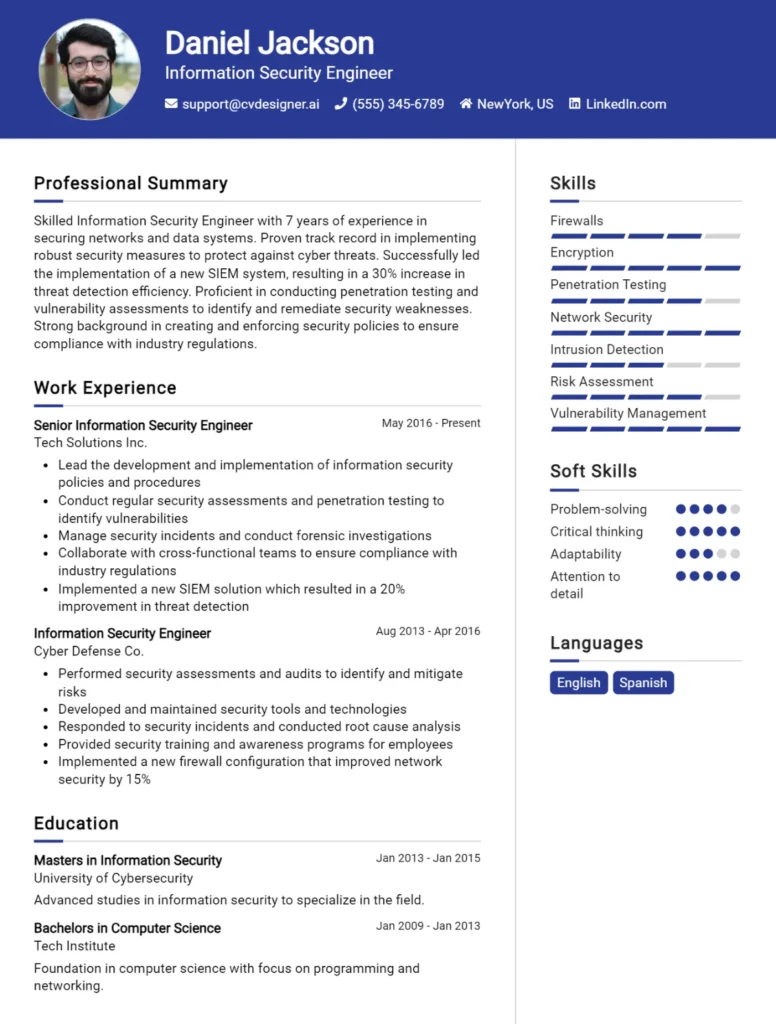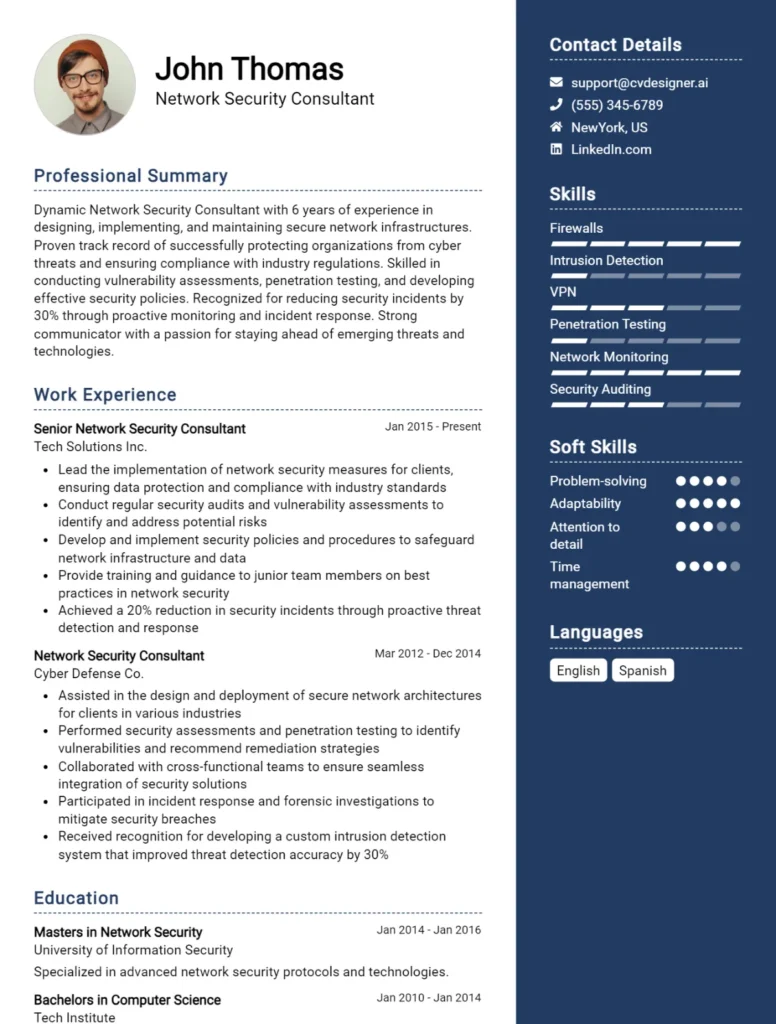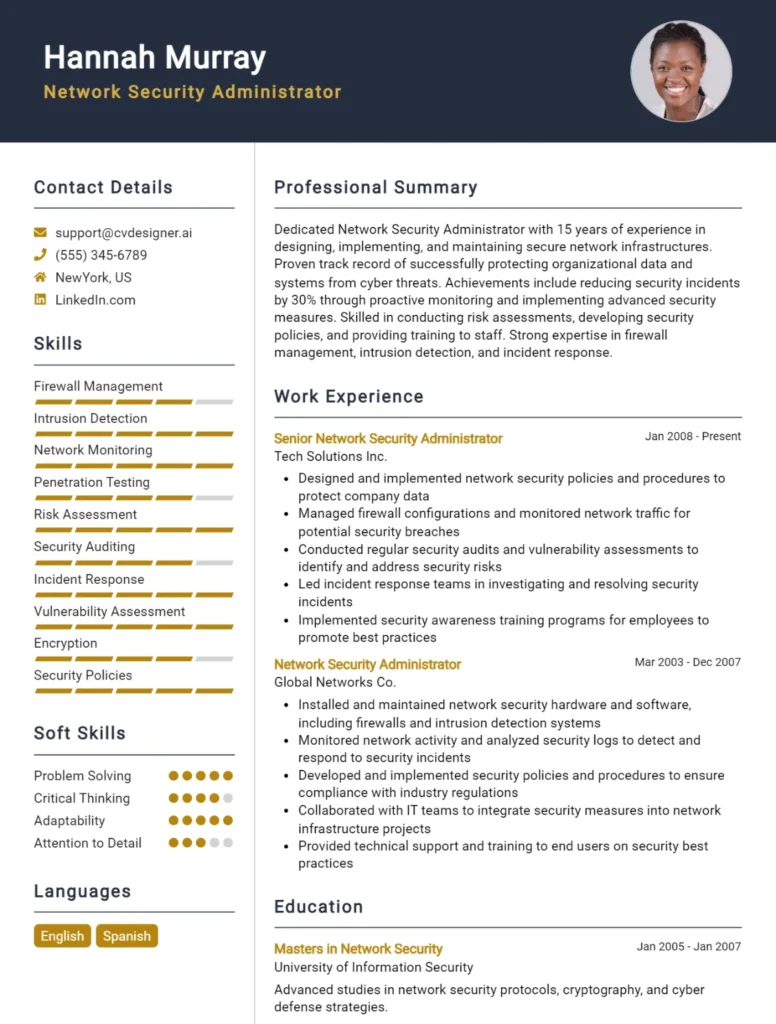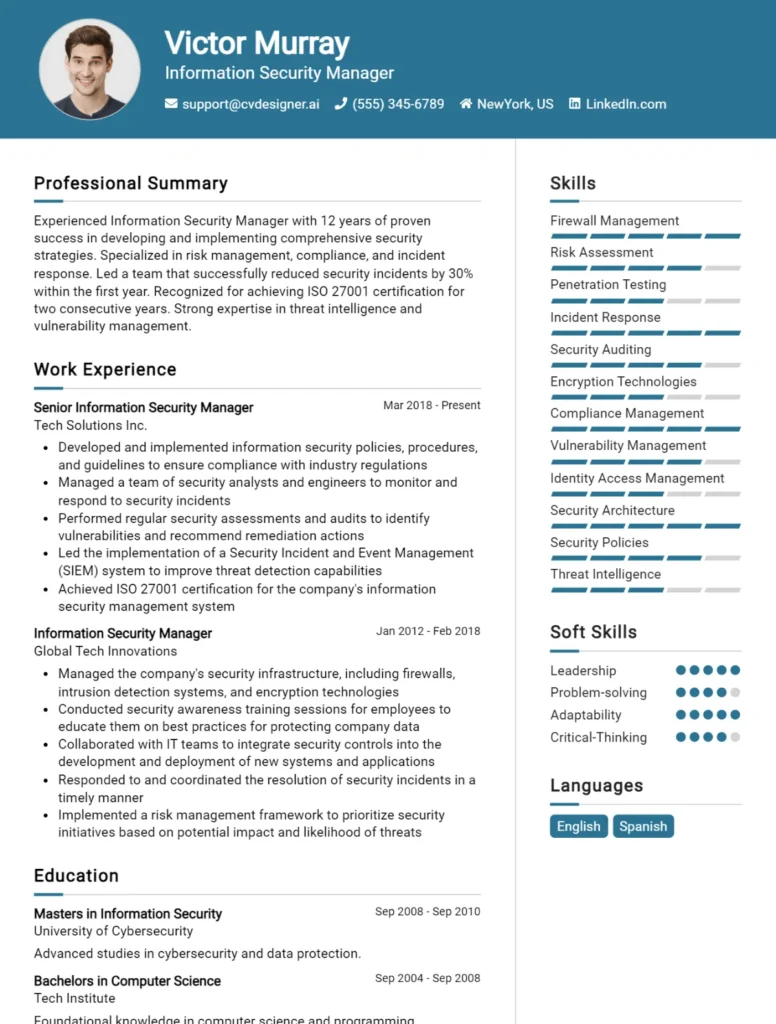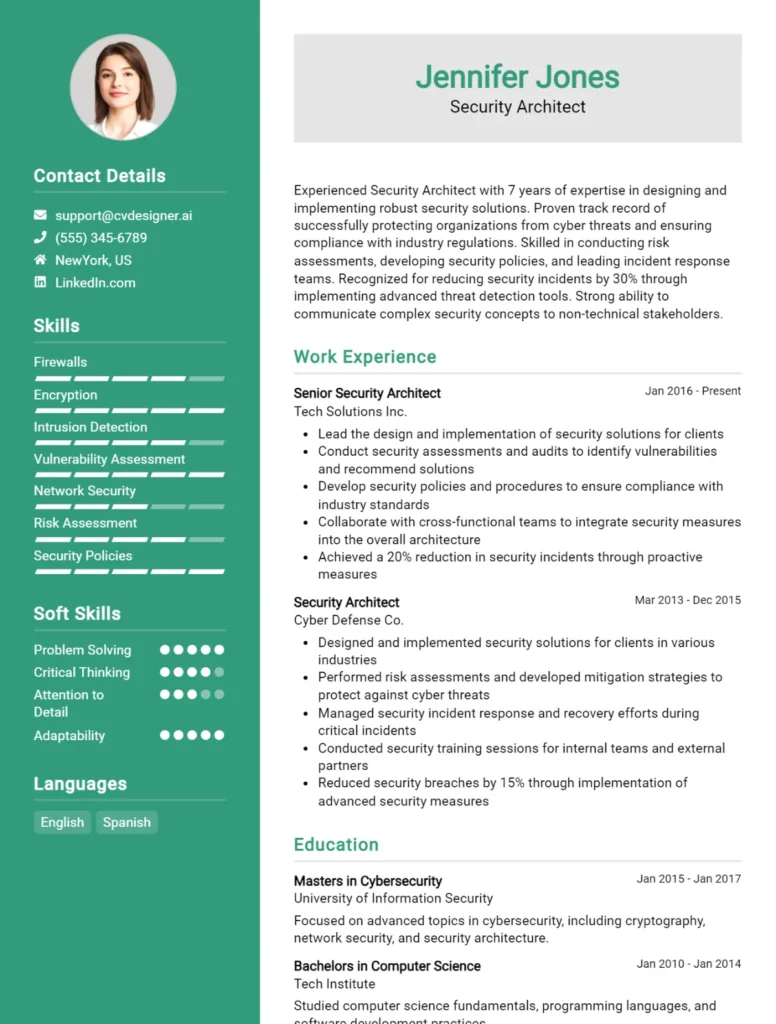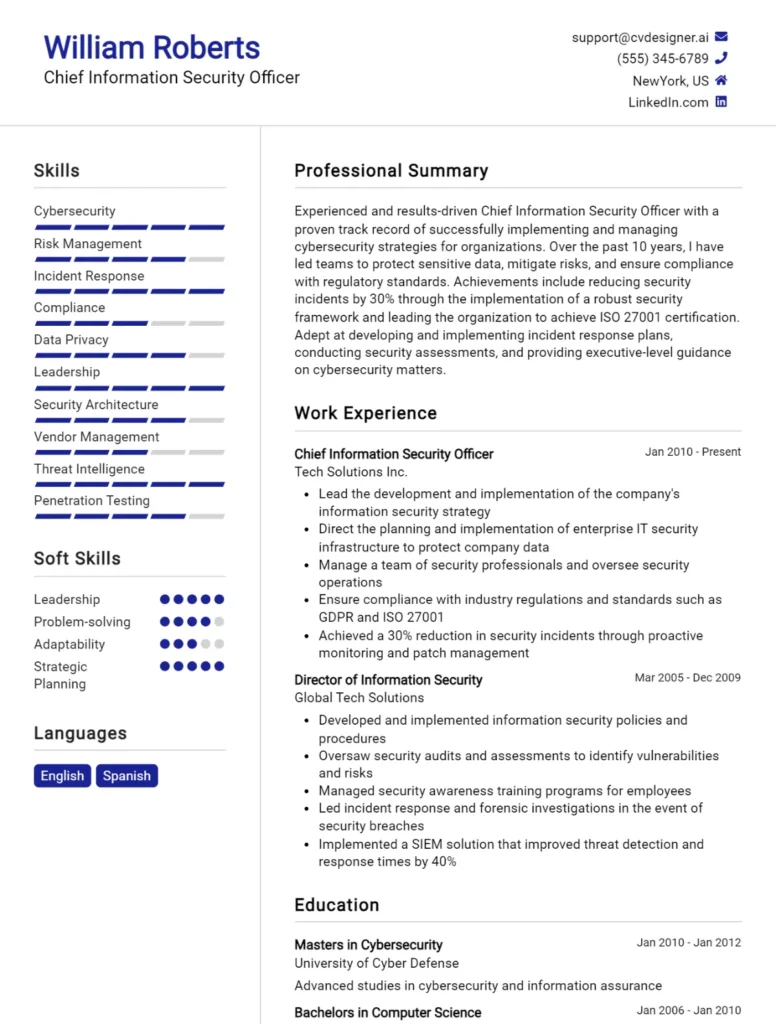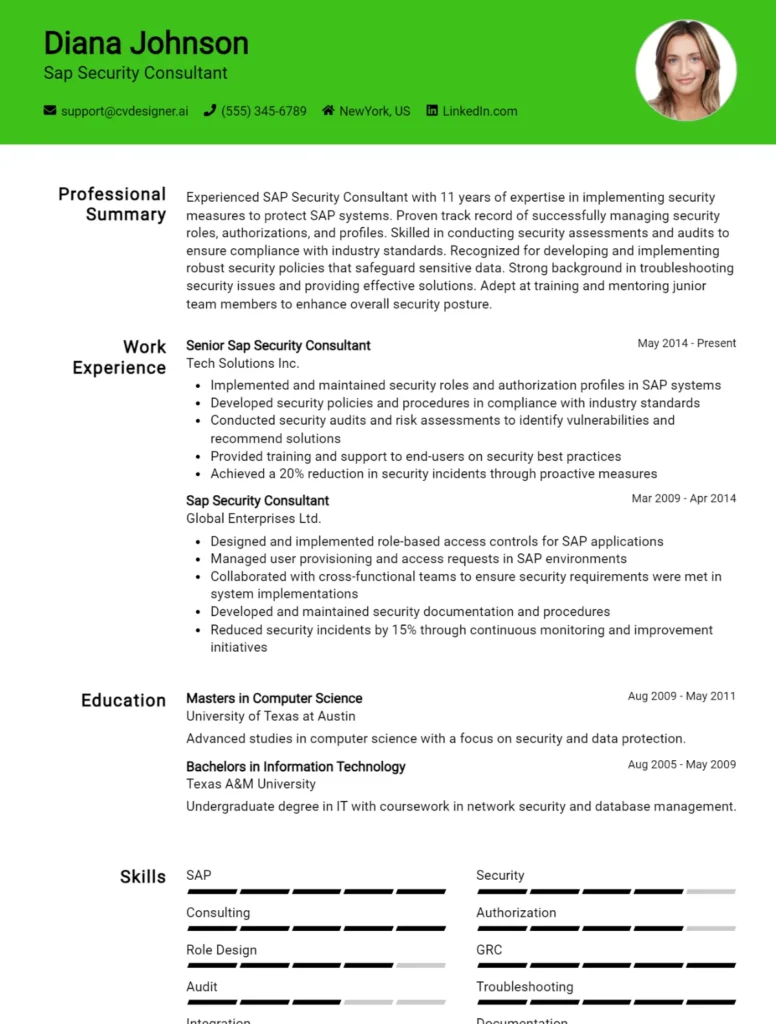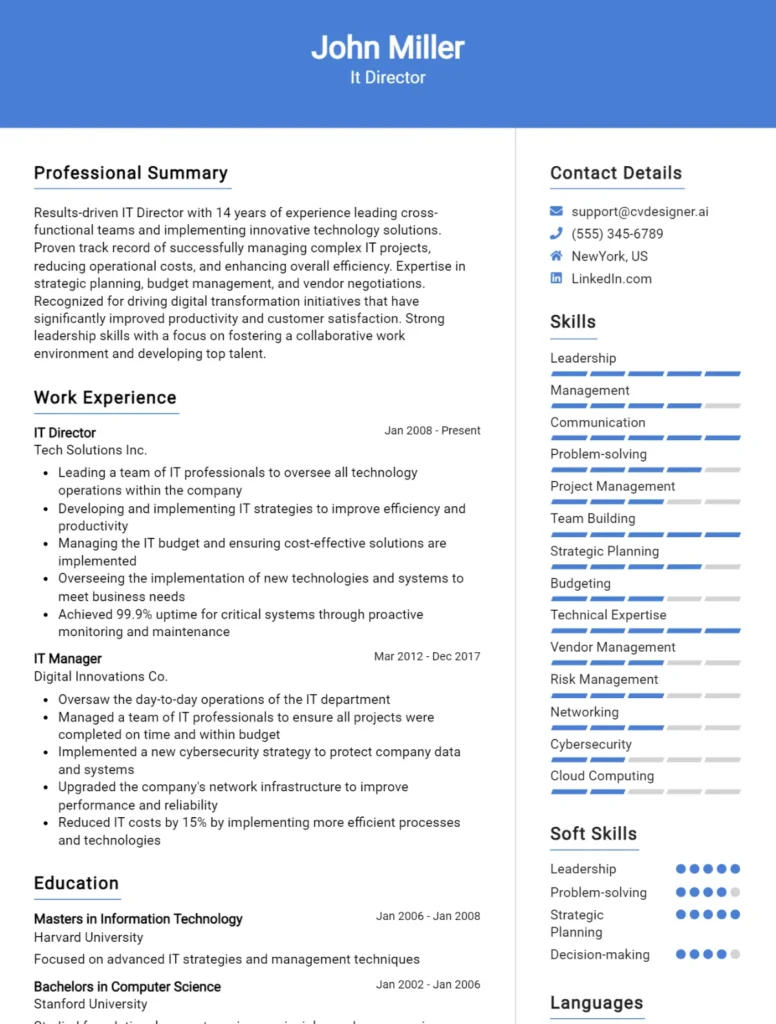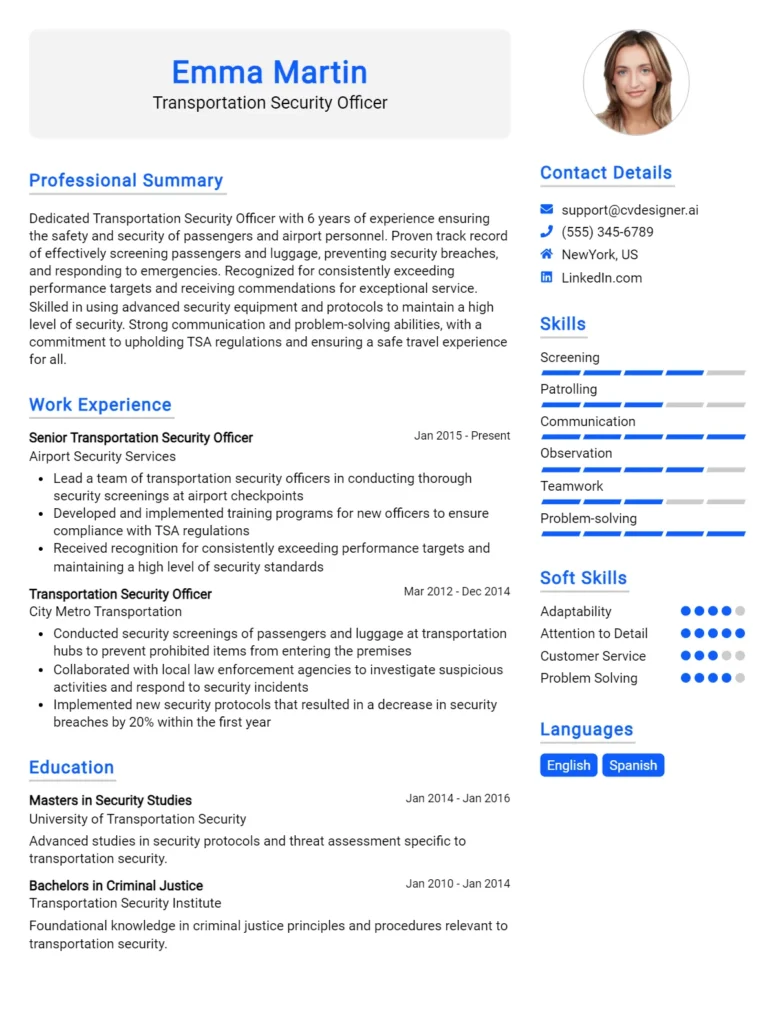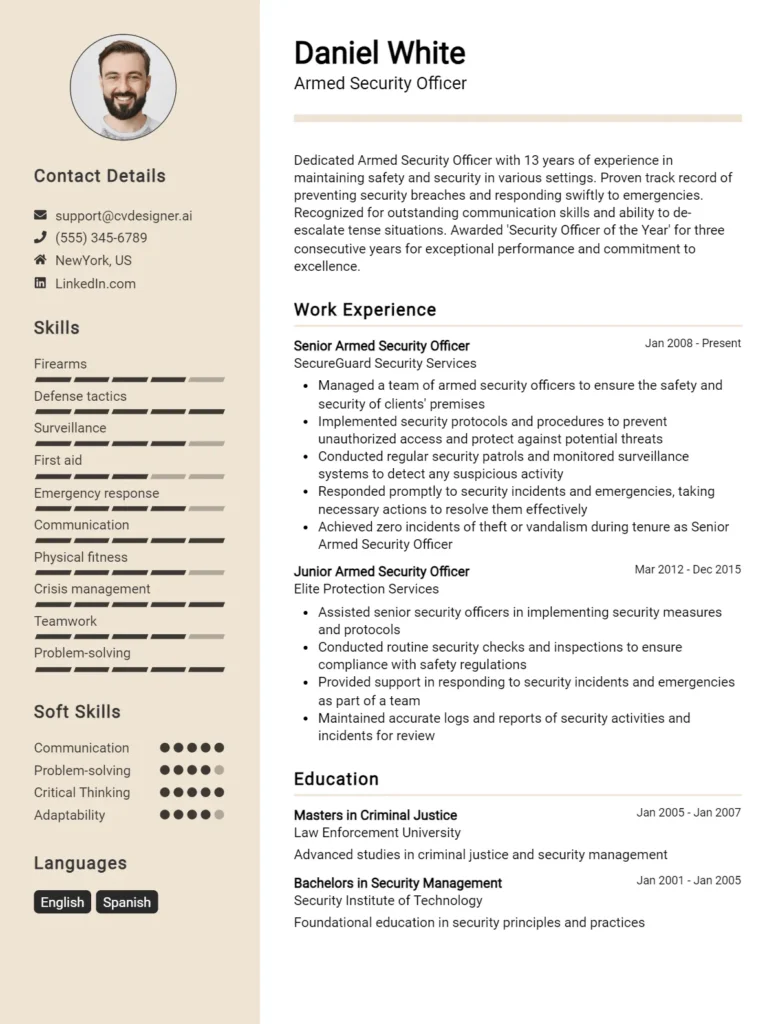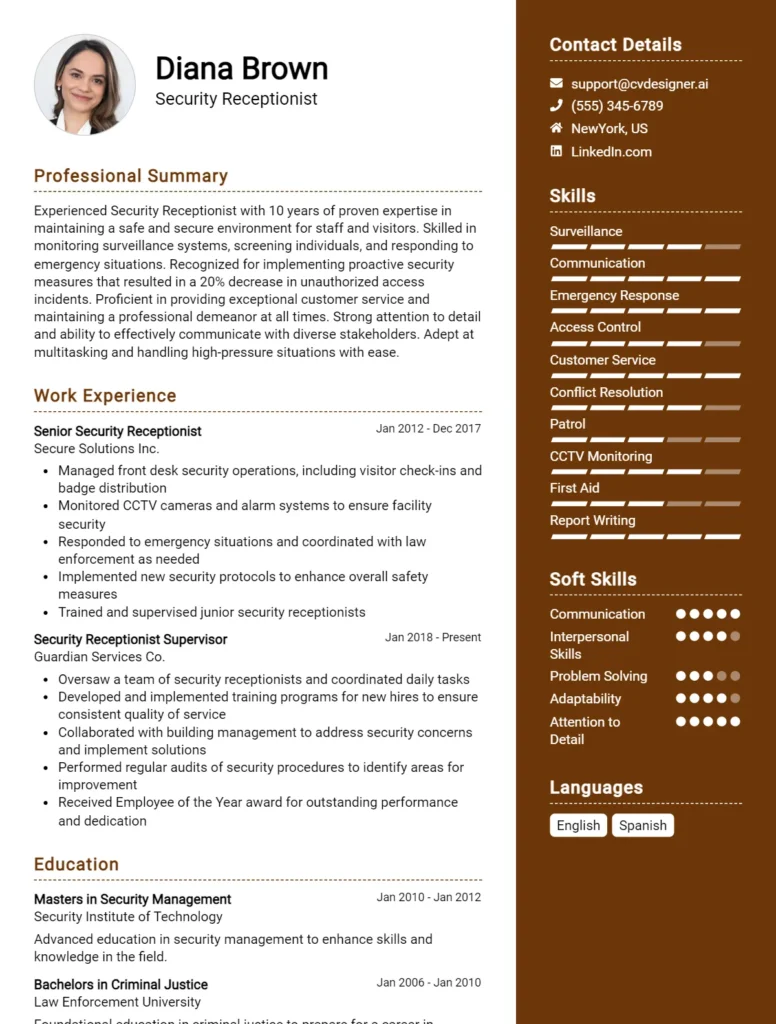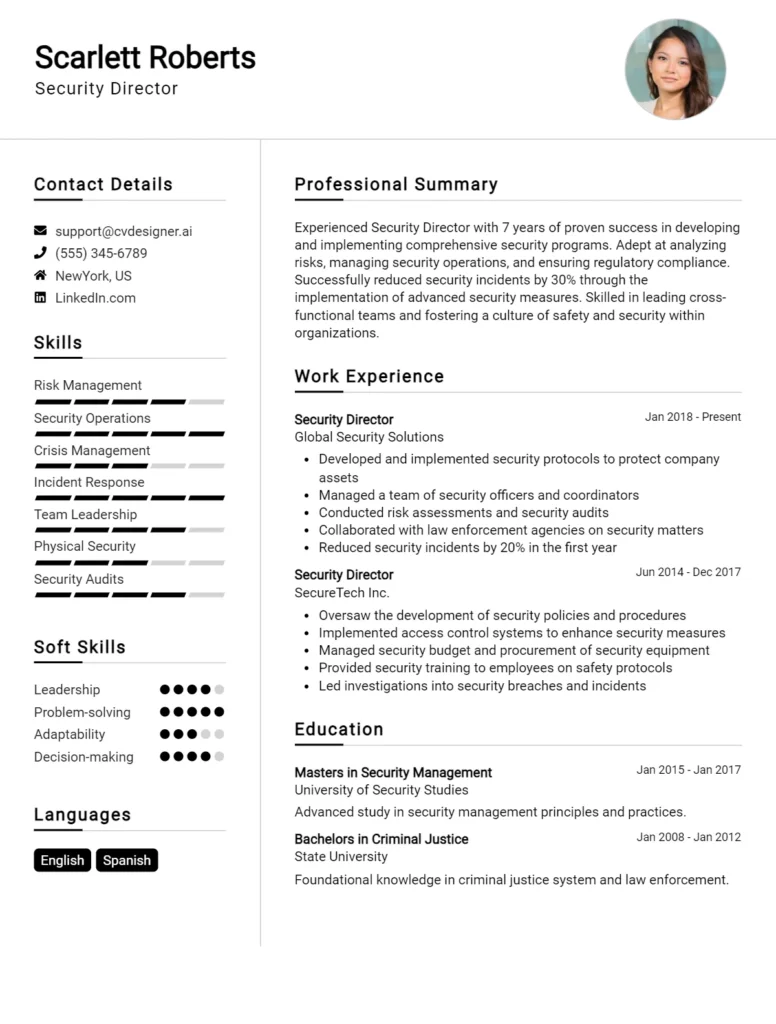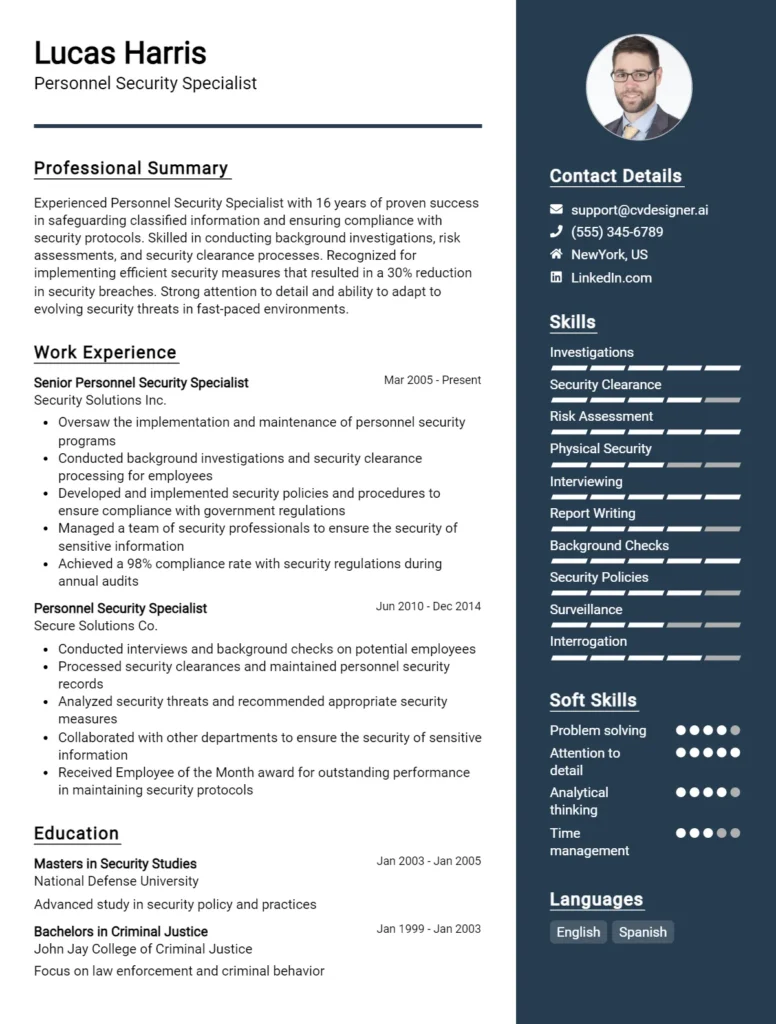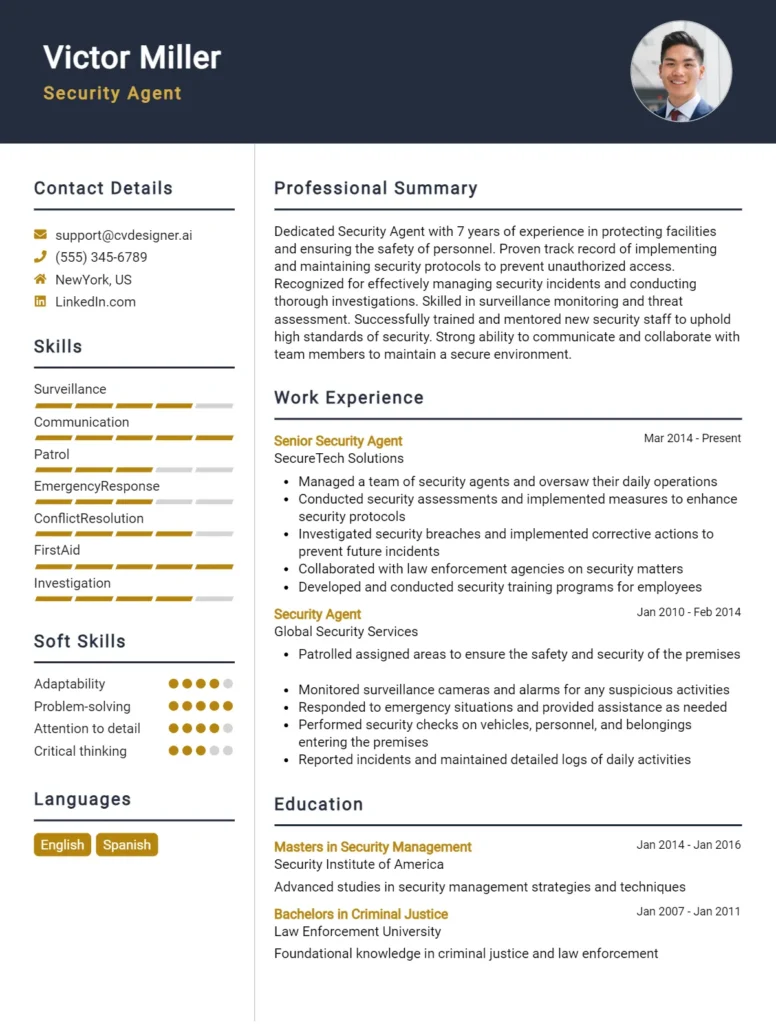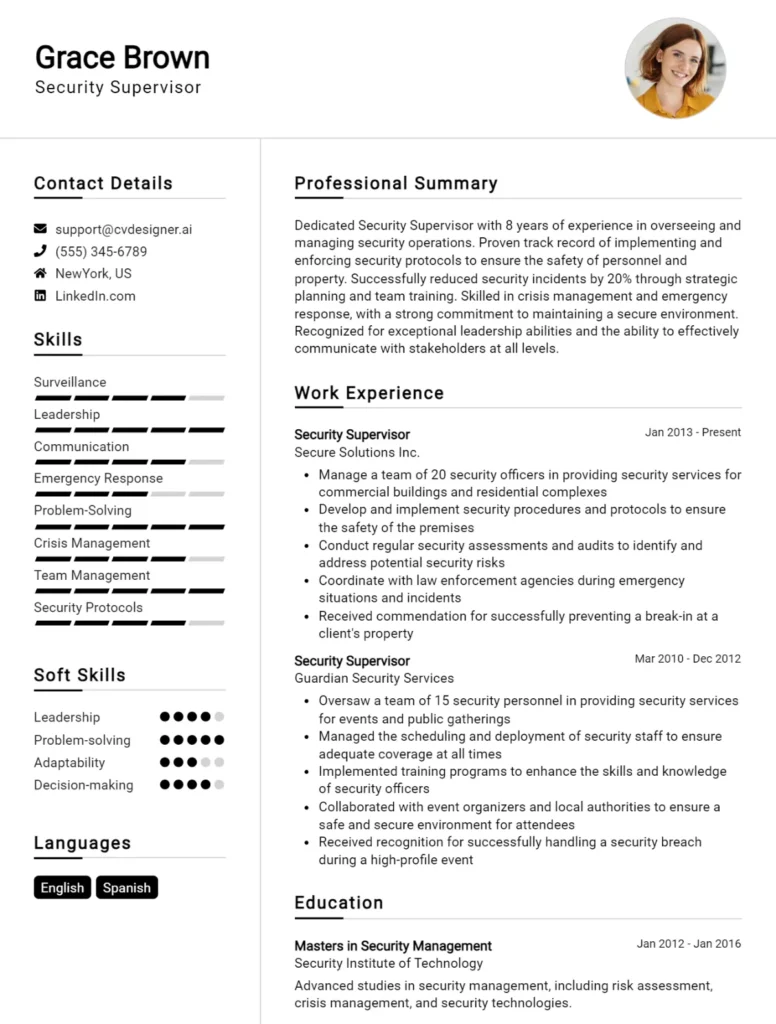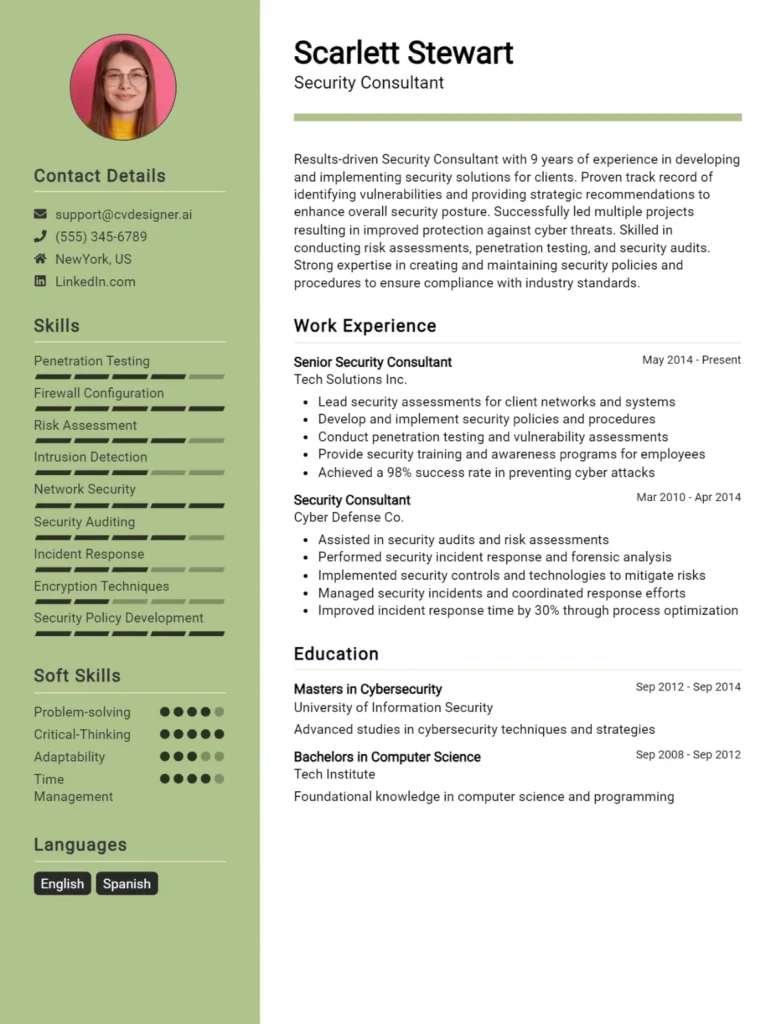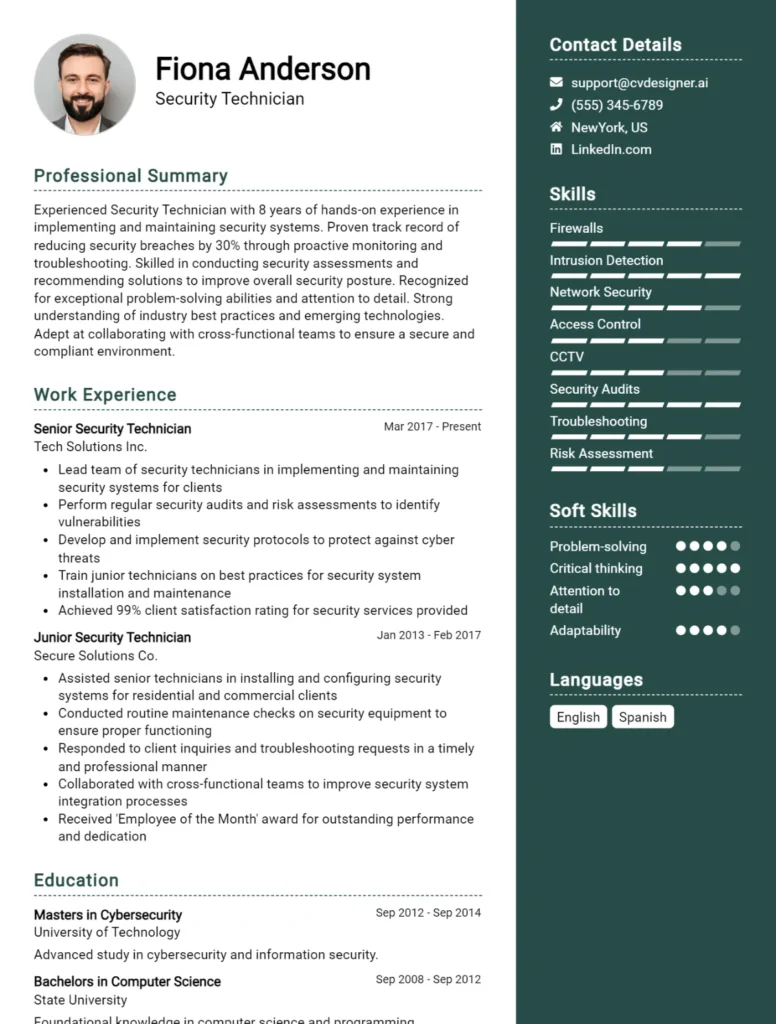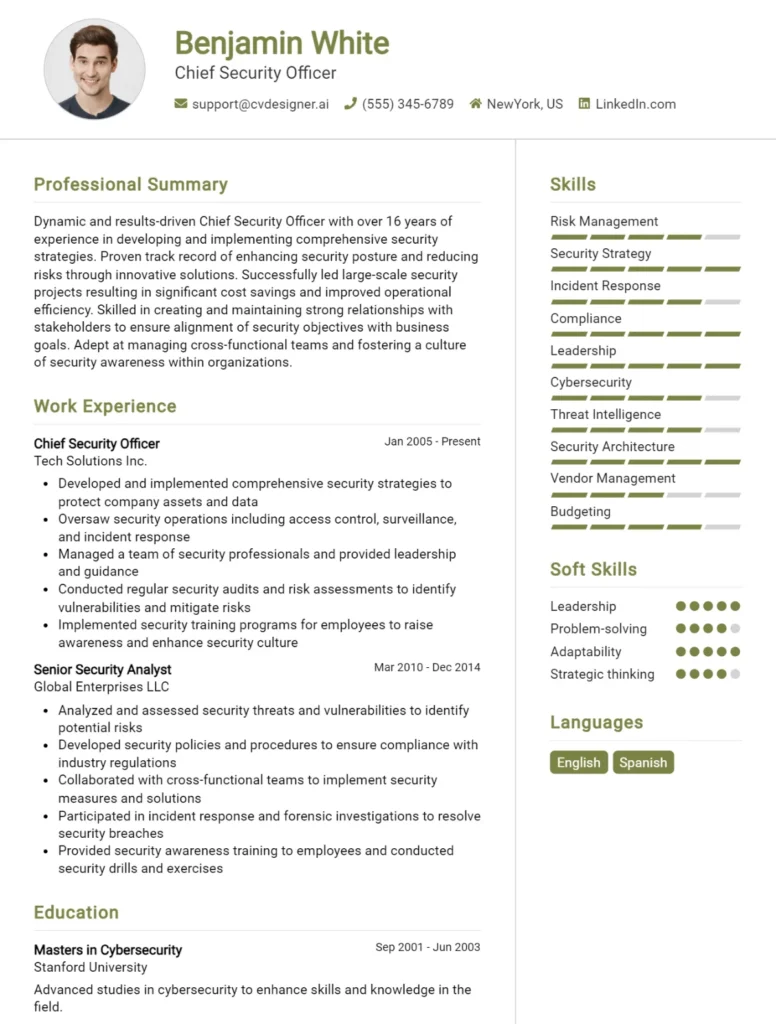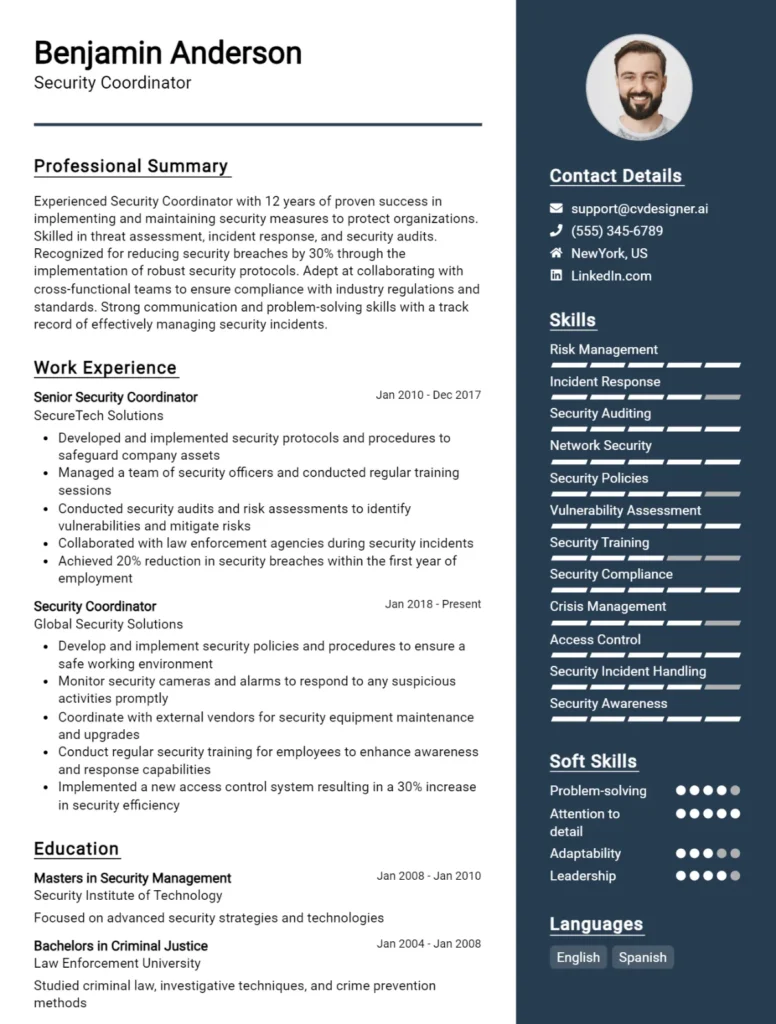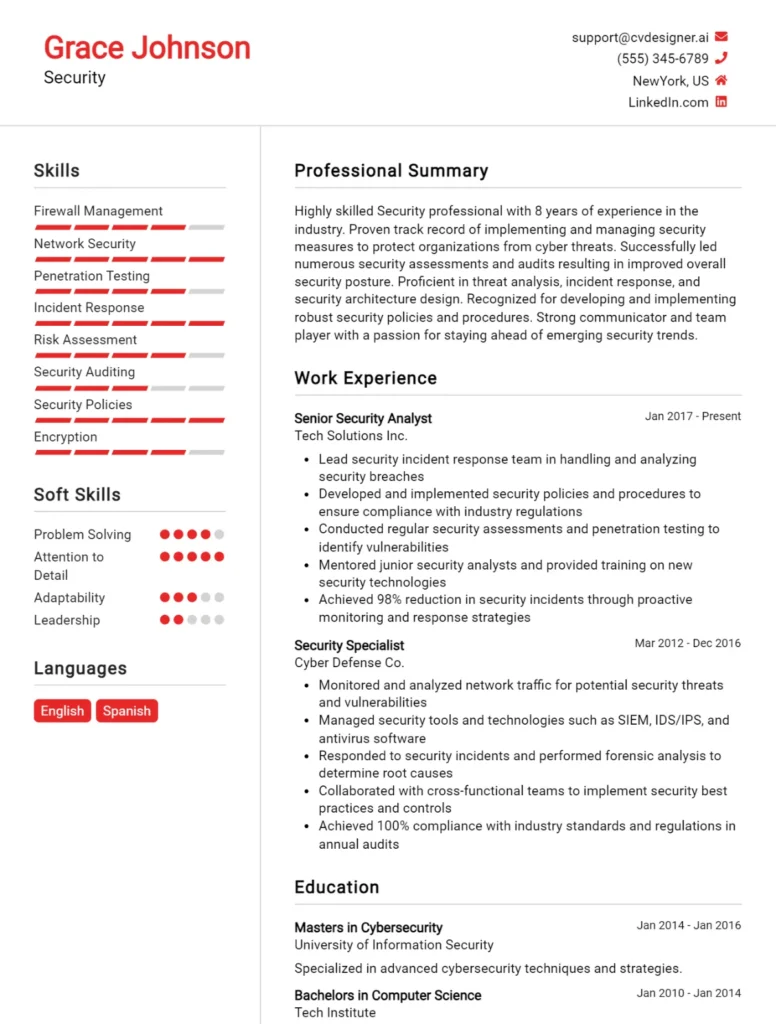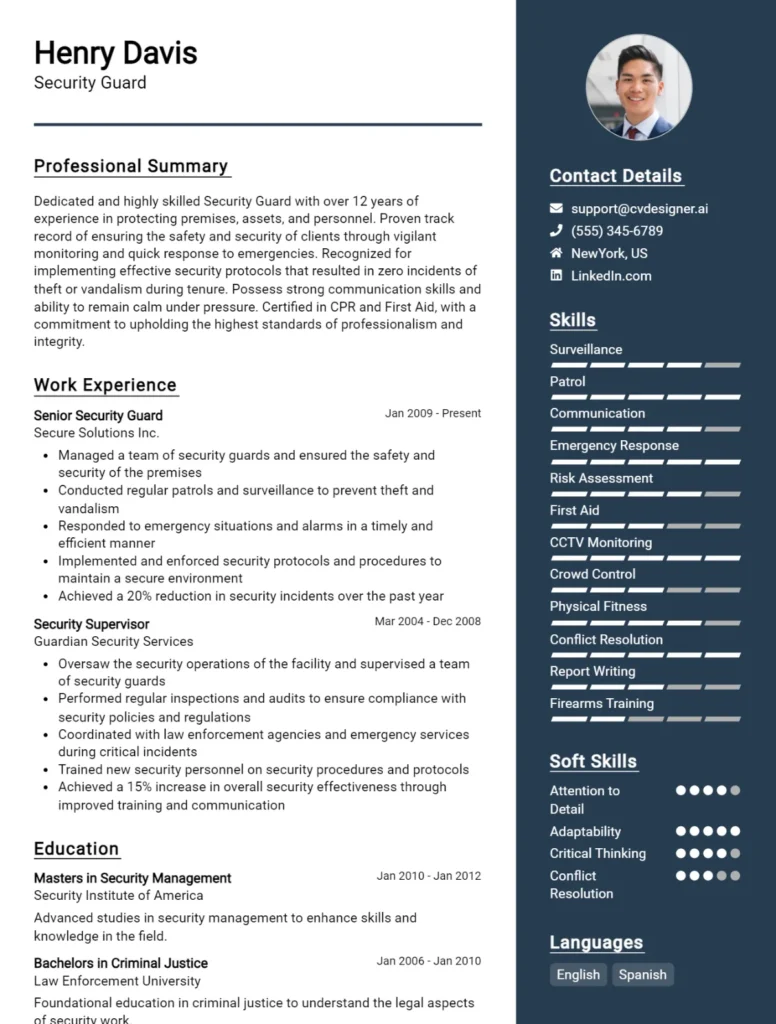Most Popular Security Engineer CV Examples
Explore additional Security Engineer CV samples and guides and see what works for your level of experience or role.
In today's digital landscape, the role of a Security Engineer is more crucial than ever, serving as the frontline defense against cyber threats and vulnerabilities. Crafting a compelling CV that effectively showcases your skills, experiences, and achievements is essential to stand out in a competitive job market. This guide will walk you through the steps of writing an impactful Security Engineer CV, providing you with practical tips and a CV example that you can adapt to your unique qualifications. By the end of this article, you'll be equipped with knowledge on:
- The essential components of a Security Engineer CV
- Effective formatting and layout strategies
- How to highlight relevant technical skills and certifications
- Tips for showcasing your work experience and projects
- Tailoring your CV for specific job applications
- Common mistakes to avoid when writing your CV
Dive in to learn how to craft a winning Security Engineer CV that opens doors to your next career opportunity!
What is a Security Engineer CV?
A Security Engineer CV serves as a critical tool for showcasing an individual's skills, experience, and qualifications in the field of cybersecurity. This document outlines the candidate's expertise in protecting systems, networks, and data from potential threats. By detailing relevant certifications, technical proficiencies, and past project involvements, a well-crafted CV not only helps candidates stand out in a competitive job market but also assists employers in assessing their fit for the role. For guidance on structuring and content, you can refer to this cv writing guide.
The importance of a Security Engineer CV extends beyond mere representation of qualifications; it acts as a professional narrative that conveys the candidate's understanding of current security challenges and their proactive approach towards mitigating them. By effectively communicating problem-solving skills and technical knowledge, the CV can open doors to interviews and networking opportunities. To simplify the process of creating a polished and eye-catching CV, consider using a cv maker that provides templates and tips tailored for the cybersecurity industry.
Key Components of a Security Engineer CV
- Contact Information: Include your full name, phone number, email address, and LinkedIn profile link to ensure potential employers can easily reach you.
- Professional Summary: A brief paragraph summarizing your experience, skills, and what you bring to the role of a Security Engineer. Tailor this section to highlight your expertise in cybersecurity.
- Skills: List relevant technical and soft skills that pertain to security engineering. Focus on areas such as network security, incident response, risk assessment, and knowledge of security frameworks. For a comprehensive list of skills, check out skills.
- Certifications: Include industry-recognized certifications such as CISSP, CEH, CISM, or any other relevant qualifications that validate your expertise in security engineering.
- Work Experience: Detail your previous employment, including job titles, company names, locations, and dates of employment. Use bullet points to describe your responsibilities and achievements in each role. For guidance on structuring this section, refer to work experience.
- Education: List your degrees, including the name of the institution, the degree earned, and graduation dates. If you have a degree in a relevant field such as Computer Science or Information Technology, be sure to highlight it.
- Projects: Showcase any significant cybersecurity projects you have worked on, either professionally or personally. Provide a brief description of each project, your role, and the outcomes.
- Technical Proficiencies: Mention specific tools and technologies you are proficient in, such as firewalls, intrusion detection systems, SIEM tools, and programming languages relevant to security.
- Publications and Presentations: If you have published articles or presented at conferences related to cybersecurity, include them to demonstrate your thought leadership and engagement with the community.
- Professional Memberships: List any relevant professional organizations you are a member of, such as (ISC)², ISACA, or other cybersecurity-related groups.
- Awards and Recognitions: Highlight any awards or recognitions received in your professional career that underscore your capabilities and contributions to the field of security engineering.
- References: Include a statement that references are available upon request or list a few professional references if you have permission from those individuals.
Sample Security Engineer CV for Inspiration
John Doe
1234 Elm Street
San Francisco, CA 94101
(123) 456-7890
john.doe@email.com
LinkedIn: linkedin.com/in/johndoe
Professional Summary
Dedicated and detail-oriented Security Engineer with over 7 years of experience in developing and implementing security solutions to safeguard sensitive information and infrastructure. Proven ability to identify vulnerabilities and enhance security measures while ensuring compliance with industry standards. Strong analytical skills and a commitment to staying ahead of emerging threats.
Work Experience
Senior Security Engineer
XYZ Corporation, San Francisco, CA
March 2020 - Present
- Led the design and implementation of a comprehensive security framework that reduced security incidents by 40% within the first year.
- Conducted regular vulnerability assessments and penetration testing to identify and mitigate risks across corporate networks and applications.
- Collaborated with cross-functional teams to develop and enforce security policies, procedures, and best practices.
- Provided training and support to staff on security awareness and incident response protocols.
- Managed security incidents and conducted root cause analysis to prevent future occurrences.
Security Engineer
ABC Technologies, San Francisco, CA
June 2016 - February 2020
- Developed and executed security solutions for cloud and on-premises environments, enhancing the overall security posture.
- Implemented multi-factor authentication and encryption protocols, resulting in a 30% decrease in unauthorized access attempts.
- Participated in security audits and compliance assessments, ensuring alignment with ISO 27001 and NIST standards.
- Collaborated with software development teams to integrate security into the SDLC through threat modeling and code reviews.
- Monitored security alerts and incidents, providing timely response and remediation strategies.
Junior Security Analyst
Tech Solutions Inc., San Francisco, CA
August 2014 - May 2016
- Assisted in the monitoring and analysis of security incidents and events, contributing to the development of incident response plans.
- Supported the implementation of security tools such as firewalls, intrusion detection systems, and antivirus solutions.
- Conducted research on emerging security threats and vulnerabilities, providing reports to senior security staff.
- Participated in security awareness training sessions for employees, promoting a culture of security consciousness.
Education
Bachelor of Science in Computer Science
University of California, Berkeley, CA
Graduated: May 2014
Skills
- Network Security
- Vulnerability Assessment & Penetration Testing
- Incident Response & Management
- Security Information and Event Management (SIEM)
- Cloud Security (AWS, Azure, GCP)
- Firewall and Intrusion Detection Systems
- Security Compliance (ISO 27001, NIST)
- Threat Modeling and Risk Assessment
- Programming Languages: Python, Java, Bash
- Strong Analytical and Problem-Solving Skills
Publications
- Doe, J. (2021). "Best Practices for Securing Cloud Infrastructure." Journal of Cybersecurity, 10(2), 45-60.
- Doe, J. (2020). "Emerging Threats in Cybersecurity: Trends and Solutions." Cybersecurity Insights, 5(1), 12-18.
Certifications
- Certified Information Systems Security Professional (CISSP)
- Certified Ethical Hacker (CEH)
- Certified Information Security Manager (CISM)
- CompTIA Security+
References available upon request.
Security Engineer CV Writing Tips
When crafting a CV as a Security Engineer, it's essential to highlight both your technical skills and practical experience in protecting information systems. Start with a strong summary that captures your expertise in security protocols, risk assessment, and incident response. Be sure to tailor your CV to the specific role you're applying for, emphasizing relevant certifications such as CISSP or CEH, and showcasing your experience with security tools and technologies. Use clear, concise language and quantify your accomplishments where possible to demonstrate your impact on previous employers. Lastly, ensure your CV is well-organized and free from errors, as attention to detail is critical in the field of cybersecurity.
CV Writing Tips for Security Engineers
- Focus on Relevant Experience: Highlight your experience in security implementations, incident responses, and vulnerability assessments that directly relate to the job description.
- Include Certifications: List relevant certifications such as CISSP, CEH, or CompTIA Security+ prominently to validate your qualifications in the field.
- Use Keywords: Incorporate industry-specific keywords from the job listing to help your CV pass through Applicant Tracking Systems (ATS).
- Quantify Achievements: Whenever possible, use numbers to illustrate your successes, such as “Reduced security incidents by 30% through proactive monitoring.”
- Highlight Technical Skills: Clearly outline your proficiency with specific security tools and technologies, such as firewalls, intrusion detection systems, or SIEM tools.
- Showcase Soft Skills: Don’t forget to mention soft skills like problem-solving, communication, and teamwork, as these are crucial for collaborating with other departments.
- Tailor for Each Application: Customize your CV for each job application to align with the specific requirements and responsibilities mentioned in the job description.
- Keep it Professional and Concise: Maintain a clean layout and keep your CV to one or two pages, ensuring that it is easy to read and professionally formatted.
Security Engineer CV Summary Examples
As a Security Engineer, your CV summary is crucial in conveying your expertise, experience, and passion for safeguarding systems and data. A well-crafted summary can set the tone for your application and highlight your unique qualifications effectively. Here are several examples of effective CV summaries for a Security Engineer role:
Dedicated Security Engineer with over 5 years of experience in implementing and managing security protocols for enterprise-level organizations. Proficient in threat analysis, vulnerability assessment, and incident response, with a strong focus on proactive measures to protect sensitive data.
Results-driven Security Engineer skilled in designing secure IT infrastructures and conducting risk assessments to mitigate vulnerabilities. Proven track record of improving security posture through innovative solutions and continuous monitoring, ensuring compliance with industry standards.
Dynamic Security Engineer with a strong background in network security and information assurance. Experienced in deploying security tools and technologies, as well as developing security policies that enhance organizational resilience against cyber threats.
Detail-oriented Security Engineer with expertise in penetration testing and security auditing. Committed to identifying weaknesses in systems and providing actionable recommendations to strengthen overall security frameworks and reduce risk exposure.
Analytical Security Engineer with a passion for cybersecurity and a solid foundation in cryptography and secure software development. Adept at collaborating with cross-functional teams to implement security measures that align with business objectives while safeguarding critical assets.
Build a Strong Experience Section for Your Security Engineer CV
As a Security Engineer, showcasing your work experience is crucial to demonstrate your technical expertise and problem-solving abilities. Your experience section should highlight your contributions to security protocols, incident response, and risk management. Below are several examples of work experience descriptions that effectively illustrate your skills and achievements in this field.
- Developed and implemented comprehensive security policies and procedures for a Fortune 500 company, reducing security incidents by 30% over two years.
- Conducted regular vulnerability assessments and penetration testing, identifying and remediating over 200 vulnerabilities across multiple systems and applications.
- Collaborated with cross-functional teams to design and deploy a multi-layered security architecture that enhanced the organization's defense against cyber threats.
- Managed the incident response process for security breaches, leading investigations that resulted in the successful containment and resolution of over 15 critical incidents.
- Spearheaded the implementation of a Security Information and Event Management (SIEM) system, improving the organization's threat detection capabilities and incident response times by 40%.
- Provided security training and awareness programs for employees, fostering a culture of security mindfulness and reducing phishing incident reports by 50%.
- Evaluated and selected security tools and technologies, optimizing the security infrastructure while adhering to budget constraints and organizational goals.
- Led the migration of cloud services to a secure environment, ensuring compliance with industry standards such as ISO 27001 and GDPR, resulting in zero security incidents post-migration.
Security Engineer CV Education Examples
A well-rounded educational background is essential for a Security Engineer, blending technical expertise with a solid understanding of cybersecurity principles. Here are some examples of relevant educational qualifications that can enhance a candidate's profile in this field:
- Bachelor's Degree in Computer Science: This foundational degree provides essential knowledge in programming, algorithms, and system architecture, serving as a cornerstone for understanding security protocols and vulnerabilities.
- Bachelor's Degree in Information Technology: Focusing on the broader aspects of IT, this degree covers essential topics such as network administration, database management, and cybersecurity, equipping graduates with the skills needed to secure diverse IT infrastructures.
- Master's Degree in Cybersecurity: An advanced degree specifically focused on security practices, risk management, and cryptography, this program prepares individuals for higher-level positions by delving deeper into the complexities of modern cybersecurity challenges.
- Bachelor's Degree in Network Engineering: This program emphasizes the design, implementation, and management of network systems, providing valuable insights into securing network infrastructures against various threats.
- Certifications such as Certified Information Systems Security Professional (CISSP) or Certified Ethical Hacker (CEH): While not formal degrees, these certifications are highly regarded in the industry and demonstrate a commitment to ongoing education and mastery of security concepts and practices.
Skills to Highlight in Your Security Engineer CV
As a Security Engineer, showcasing a blend of technical expertise and interpersonal abilities is crucial for success in protecting information systems from threats. A well-crafted CV should reflect both hard and soft skills that underscore your qualifications and readiness to tackle the ever-evolving landscape of cybersecurity.
Soft Skills:
- Analytical Thinking
- Problem-Solving
- Attention to Detail
- Communication Skills
- Team Collaboration
- Adaptability
- Time Management
- Critical Thinking
- Conflict Resolution
- Leadership
Hard Skills:
- Network Security Protocols
- Vulnerability Assessment Tools
- Intrusion Detection Systems (IDS)
- Risk Management Frameworks
- Security Information and Event Management (SIEM)
- Firewall and Endpoint Security
- Incident Response Planning
- Encryption Standards and Practices
- Cloud Security Technologies
- Penetration Testing Techniques
Security Engineer CV Format
When crafting a CV for a Security Engineer position, it's essential to tailor your document according to your level of experience. A well-structured CV not only highlights your technical skills but also showcases your problem-solving abilities and understanding of security protocols. Depending on your job level—entry-level, mid-level, or senior-level—the format and focus of your CV may differ.
For entry-level Security Engineers, a functional or combination format works best, emphasizing skills over experience.
For mid-level Security Engineers, a chronological format is ideal, showcasing a clear career progression along with relevant accomplishments.
For senior-level Security Engineers, a targeted format that highlights leadership, strategic planning, and project management skills is recommended, often with a focus on major achievements and contributions to organizational security.
- Start with a professional summary that succinctly outlines your expertise, key skills, and career goals.
- Use clear, concise headings for sections like Experience, Education, Certifications, and Skills to enhance readability.
- Tailor your CV to the specific job by including relevant keywords from the job description.
- Quantify your achievements where possible, such as "Reduced security breaches by 30% through proactive measures."
- Include a section for certifications, as these are crucial in the security field (e.g., CISSP, CEH, or CompTIA Security+).
- Consider adding a section for technical skills, focusing on tools and technologies you are proficient in, such as firewalls, intrusion detection systems, or SIEM tools.
For more details on creating a compelling CV, refer to this cv format.
Common Mistakes to Avoid in a Security Engineer CV
When crafting a CV for a Security Engineer position, it's crucial to present your skills, experience, and qualifications in a manner that highlights your expertise while avoiding common pitfalls. A well-structured CV can set you apart from other candidates in this competitive field. Here are some common mistakes to avoid when creating your Security Engineer CV:
- Lack of Tailoring: Failing to customize your CV for each specific job application can make your resume less relevant to employers.
- Overloading with Jargon: Using excessive technical jargon without context can confuse recruiters who might not be familiar with every term.
- Ignoring Soft Skills: Focusing solely on technical abilities and neglecting soft skills such as communication, teamwork, and problem-solving can give an incomplete picture of your capabilities.
- Inadequate Quantification of Achievements: Not including measurable achievements or outcomes can make it difficult for employers to gauge the impact of your work.
- Poor Formatting: A cluttered or unprofessional layout can hinder readability and detract from your qualifications.
- Neglecting Keywords: Not incorporating relevant industry keywords can result in your CV being overlooked by applicant tracking systems (ATS).
- Listing Responsibilities Instead of Accomplishments: Simply listing job duties rather than highlighting specific achievements can make your experience seem less impactful.
- Using an Unprofessional Email Address: An email address that is not professional can create a negative impression right from the start.
- Failing to Update: Not keeping your CV updated with the latest certifications, skills, and experiences may lead to missed opportunities.
- Lengthy CVs: Creating an overly long CV can overwhelm recruiters; aim for conciseness while still providing necessary details.
Key Takeaways for a Security Engineer CV
- Tailored Summary: Start with a concise professional summary that highlights your experience in cybersecurity, key certifications, and specific skills related to security engineering.
- Relevant Skills: Include a skills section that lists technical proficiencies such as intrusion detection systems, firewalls, encryption technologies, and incident response.
- Certifications: List relevant certifications like CISSP, CEH, or CISM prominently to demonstrate your qualifications in the field.
- Project Experience: Detail specific projects you have worked on, including the technologies used and the impact of your contributions on the organization’s security posture.
- Technical Proficiencies: Mention programming languages (e.g., Python, C++, Java) and tools (e.g., Wireshark, Metasploit) that you are proficient in, showcasing your ability to implement security measures.
- Incident Management: Include experiences related to security incidents you’ve managed, emphasizing your role in detection, response, and remediation efforts.
- Collaboration and Communication: Highlight experiences where you worked with cross-functional teams, showcasing your ability to communicate complex security concepts to non-technical stakeholders.
- Continuous Learning: Reflect your commitment to ongoing education in cybersecurity, mentioning any relevant workshops, courses, or training sessions you've attended.
- Results-Oriented Achievements: Use quantifiable metrics to demonstrate your achievements, such as percentage reductions in security incidents or successful audits.
- Professional Affiliations: Mention memberships in professional organizations such as (ISC)², ISACA, or local cybersecurity groups, indicating your engagement with the professional community.
- Custom CV Templates: Utilize cv templates to create a visually appealing and professional layout that makes your CV stand out.
- Efficient CV Creation: Consider using a cv builder to streamline the process of creating a well-structured and formatted CV tailored for security engineering roles.
- Complementary Cover Letter: Don’t forget to craft a compelling cover letter using cover letter templates that aligns with your CV and highlights your enthusiasm for the role.
Build your CV in minutes
Use an AI-powered cv builder and have your cv done in 5 minutes. Just select your template and our software will guide you through the process.
